(6) Gender Mainstreaming and Inclusive Society
It is often the case that the social norms and systems in developing countries are generally shaped by men’s perspectives, which leave women in vulnerable positions in many aspects. On the other hand, women are critical actors in each country’s development, and their participation leads not only to the improvement of their own lives but also to increasing the impact of the development. For example, improving the literacy of women who have had few or no educational opportunities so far increases their access to correct information on public health and prevention of infectious diseases such as HIV/AIDS, and leads to appropriate family planning, which will promote women’s social advancement and economic empowerment. Moreover, it contributes to the sustainable and inclusive economic growth of developing countries.
The “2030 Agenda for Sustainable Development (2030 Agenda)” strongly and clearly addresses that “Realizing gender equality and the empowerment of women and girls will make a crucial contribution to progress across all the Goals and targets.” In concrete terms, SDG 5 seeks to “Achieve gender equality and empower all women and girls.” Gender equality and promoting women’s empowerment are essential for realizing “quality growth.” For this purpose, it is important that men and women participate equally in all phases of development cooperation and reap the benefits equitably.
Challenges such as poverty, conflicts, infectious diseases, terrorism, and natural disasters have varying impacts depending on the situations that individuals are in, including their country and region, or whether they are women and/or children. As a result of infectious diseases, conflicts, large-scale natural disasters, and other factors, the global population living in poverty is increasing, while in some countries disparities have widened and humanitarian situations have been worsening, which created an even further need for support for people who tend to be in vulnerable situations. The concept of human security, which focuses on the protection and empowerment of each individual, is thus indispensable for the realization of a society that fulfills the principle of the SDGs, “no one will be left behind.”
● Japan’s Efforts
■ Promotion of Women’s Empowerment and Participation
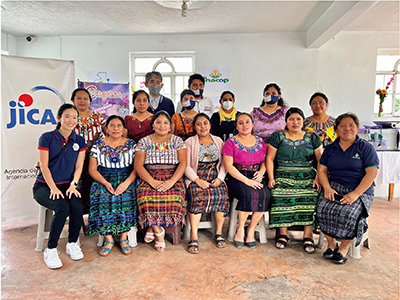
Women receiving entrepreneurship training from a JICA expert in Department of Sololá, Guatemala (Photo: JICA)
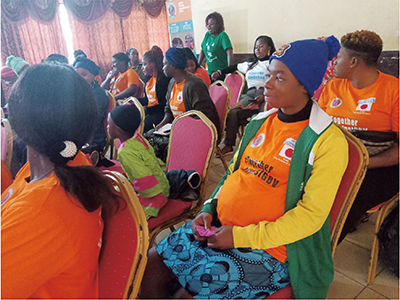
Women participating in training in Cameroon as part of a project aimed at protecting internally displaced persons from threats such as gender-based violence and strengthening their resilience (Photo: UN Women/Melvin Songwe, United Youth Organization)
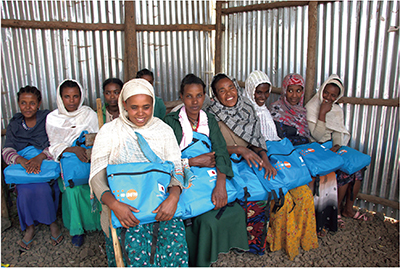
Internally displaced women in Ethiopia receiving dignity kits (Photo: UNFPA Ethiopia)
In the “Development Strategy for Gender Equality and Women’s Empowerment,”Note 78 Japan set the following three basic principles: (i) promoting women’s rights, (ii) building the capacity of women to reach their full potentials, and (iii) advancing women’s leadership in political, economic, and other public fields. Based on this strategy, Japan advances its efforts in the international community to promote gender mainstreaming,Note 79 gender equality, and women’s and girls’ empowerment.
Japan contributed 50 million US dollars to the Women Entrepreneurs Finance Initiative (We-Fi),Note 80 and an additional 5 million US dollars in June 2023. As of June 2023, Japan has supported 149,256 women-owned/led small and medium enterprises (WSMEs) in 67 countries. Specifically, 127,428 WSMEs have received financial assistance while 28,404 received training to acquire the skills and knowledge necessary for management. According to the World Bank, 70% of WSMEs in developing countries are unable to receive financing from financial institutions or are faced with poor borrowing terms. In response to such a situation, through We-Fi, Japan promotes the development of legal systems free from gender discrimination and supports women entrepreneurs in having equal access to financing and markets.
As the G7 Presidency in 2023, Japan led the G7’s efforts on gender (see Part I, Section 2 for details).
In December, the Gender Equality Advisory Council (GEAC), an external advisory body that provides recommendations on gender equality for G7 leaders, submitted the final report, “Gender Mainstreaming for an Inclusive, Peaceful, and Just Society,” which compiled its recommendations to Prime Minister Kishida. In the same month, as a follow-up event of the GEAC and World Assembly for Women (WAW!),Note 81 Japan hosted the Symposium on GEAC Report 2023 and the Women, Peace and Security (WPS) Panel Discussion under the theme of “How Japan can contribute to promoting women’s participation in international peace and security,” where participants consisting of practitioners and high-level members engaged in discussions.
Japan also provides support through UN Women and contributed approximately 14 million US dollars in 2022 and 21 million US dollars in 2023 for promoting political participation and economic empowerment of women, eliminating sexual and gender-based violence against women and girls, enhancing women’s role in the peace and security fields, and strengthening gender-responsive policies and budgets. In addition, in 2023, Japan provided emergency assistance and support for ensuring the means of livelihood to women who have been economically and socially affected by conflicts and disasters in Africa, the Middle East, Asia, and Eastern Europe, including Afghanistan and Ukraine. For example, in Pakistan, 60 women community centers were established in the six months from February to August to promote women’s independence, with 6,609 women and 1,131 girls using the centers, and 7,000 women were assisted in obtaining identity documents. Furthermore, the centers provided 280 men and community leaders with support to combat gender-based violence and improve their knowledge of gender equality.
Japan considers sexual violence in conflict cannot be tolerated. Therefore, Japan places importance on collaboration with the UN Office of the Special Representative of the Secretary-General on Sexual Violence in Conflict (OSRSG-SVC).Note 82 In 2023, Japan contributed approximately 1.04 million US dollars to the OSRSG-SVC to provide medical and psychological support and support for socio-economic reintegration in Mali to women who have been or are at risk of being victims of conflict-related sexual violence by armed forces.
Japan also contributed an additional 2 million euros in 2023 to the Global Survivors Fund (GSF),Glossary making it a total of 8 million euros in contributions so far. Japan, as its board member, actively contributes to supporting survivors of conflict-related sexual violence in conflict-affected areas, including Afghanistan, the Democratic Republic of Congo, and Ukraine.
■ Women, Peace and Security (WPS)
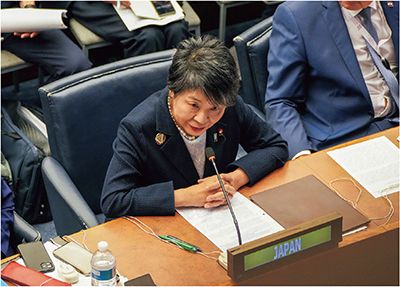
Foreign Minister Kamikawa delivering a statement at the “WPS Focal Points Network High-Level Side Event” in September 2023
Japan has formulated its National Action Plan since 2015 to implement UN Security Council resolution 1325Note 83 on Women, Peace and Security (WPS), adopted in 2000, which was the first Security Council resolution to explicitly link women to the peace and security agenda, and other relevant resolutions. In April 2023, the Government of Japan formulated the Third Edition of the National Action Plan (2023-2028) based on exchanges of opinions with relevant government ministries and agencies, experts, NGOs, civil society, and public comments. Specifically, Japan, with the cooperation of relevant ministries and agencies, supports women in conflict-affected and fragile countries, mainly through international organizations and bilateral assistance. In September 2023, Foreign Minister Kamikawa attended the “WPS Focal Points NetworkNote 84 High-Level Side Event” and stated that Japan, as a non-permanent member of the Security Council, will continue to promote the discussion on WPS as an important agenda of the UN.
In December, Foreign Minister Kamikawa participated in the “Second Global Refugee Forum,” in which Japan served as one of the coconveners and stated that the concept of WPS is essential when considering solutions for refugees and displaced persons (see “ODA Topics” for the “Second Global Refugee Forum”).
In January 2024, the Taskforce on Women, Peace and Security (WPS) was established to provide coordination across the Ministry of Foreign Affairs (MOFA).
In terms of the G7 framework, under the G7 WPSNote 85 Partnership Initiative (2018), Japan has assisted its partner country of Sri Lanka since 2019. Japan provides assistance for the formulation of its WPS Action Plan and for women’s financial empowerment, including for the households of widows who are left behind after the 26-year internal conflict, as a project for the implementation of the country’s Action Plan. The livelihood support provided by this partnership is appreciated by the Government of Sri Lanka as a catalyst for economic recovery as well as a contribution to peace building and reconstruction in the region (see “ODA Topics” for the documentary videos produced by MOFA that focus on “Japanese Women Delivering Hope in a World of Uncertainty”).
■ Assistance for People who Tend to be in Vulnerable Situations
(Disability and Development)
Persons with disabilities are often placed in difficult situations in society. Japan’s ODA pays due attention to the situation of people who are denied equal participation in society, including persons with disabilities. Article 32 of the Convention on the Rights of Persons with DisabilitiesNote 86 stipulates that States Parties would undertake measures for international cooperation and its promotion.
Policies for persons with disabilities cover a number of different areas, such as welfare, health and medical care, education, and employment. Japan applies its accumulated expertise and experiences in these areas to support developing countries in implementing measures and policies on disability through ODA and NGO activities.
For example, Japan takes a thorough hands-on approach to suit various local needs, such as by incorporating accessible design in the planning of railroad and airport construction, developing vocational training centers and rehabilitation facilities (for people with disabilities), and providing minibuses as transportation for persons with disabilities. Additionally, Japan provides a wide range of technical cooperation through JICA to enhance the capacity of organizations and personnel engaged in the field of assisting persons with disabilities and development. These efforts include the acceptance of trainees from developing countries and the dispatch of JOCVs and experts who aim to promote social participation and employment (see “Featured Project 5” regarding the assistance for children with disabilities in Kenya. In addition, see “Featured Project 2” for efforts on elections in Timor-Leste).
(Assistance for Children)
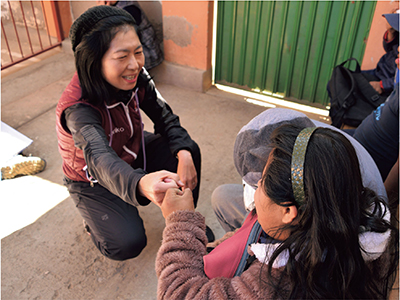
A JOCV working with students with intellectual disabilities at a special-needs school in Bolivia (Photo: JICA)
Generally, children tend to be in vulnerable situations. Today, there are many children around the world placed in harsh environments due to the aftereffects of the COVID-19 pandemic in addition to conflicts, natural disasters, etc. In response to this situation, Japan provides a variety of humanitarian and development cooperation for children bilaterally and through international organizations. In 2023, through the United Nations Children’s Fund (UNICEF), Japan provided assistance for children being affected by poverty, conflict, increasing natural disasters due to climate change, persistent COVID-19, and other factors in 40 countries mainly in Asia, Oceania, Eastern Europe, the Middle East, and Africa.
Under the Grant Assistance for Grass-Roots Human Security Projects,Note 87 which supports grass-roots level economic and social development initiatives, Japan implements projects that contribute to improving children’s living conditions, such as the construction and refurbishment of schools, provision of medical equipment to hospitals, and development of water supply facilities.
For example, in Thailand, Japan supported procuring vehicles at a children’s home in Kanchanaburi Province. This will enable safe and efficient transportation of the children cared for at the children’s home to school, hospitals, and other places, and is expected to improve the children’s living and educational environment.
In Uruguay, Japan provided assistance to improve after-school club facilities for primary, junior and senior high school students in Treinta y Tres Department. It is expected to provide nutritious meals and an appropriate learning environment for the children attending the schools, and also help alleviate the problem of children on waiting lists.
(Support for People in Conflict Situations)
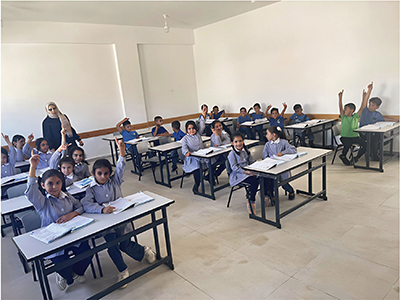
Students at an elementary school in the village of Harbasa Bani Hares in Palestine taking a class in a spacious environment.
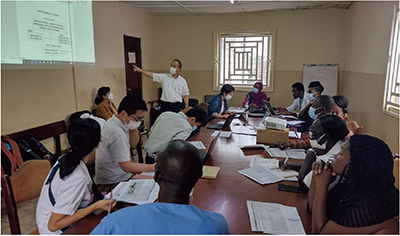
Japanese experts discussing ways to improve services at the only tertiary pediatric hospital with hospital staff members in Sierra Leone (Photo: Asuka World Consultants)
It is also important to note that in times of conflict, those in difficult social positions, including persons with disabilities and children, are the most susceptible to the situation. Socially vulnerable people, such as the rapidly increasing number of child refugees and displaced persons, in addition to persons with disabilities caused by conflict or landmines, orphans, widows, and ex-combatants, including child soldiers, are susceptible to the impact of a conflict. However, the reality remains that assistance for them is delayed in post-conflict recovery and they have difficulty accessing the benefits of peace and reconstruction.
From this perspective, Japan provides support for the social reintegration of child soldiers and the protection and empowerment of children who are the most vulnerable in conflict-affected areas, through UNICEF. For example, Japan supports the social reintegration of former child soldiers in the Democratic Republic of the Congo and Iraq, the protection of children separated from their families in Afghanistan and Somalia, explosives risk reduction education in Myanmar, the protection of children and women who are victims of sexual violence in Ethiopia and Mali, and mental health care for children in Ukraine.
Through the Office of the United Nations High Commissioner for Refugees (UNHCR), Japan carries out protection activities for refugees and displaced persons, as well as providing humanitarian assistance tailored to the needs of those particularly likely to be in vulnerable situations. For example, in Uganda, Japan provides psychosocial support to children in refugee settlements to protect them from violence, abuse, and exploitation. In Ukraine, Japan provides daily necessities, shelter support, legal assistance, etc., to vulnerable people, such as elderly people who have lost their homes due to war and female-headed households (see “Featured Project” for support for refugee children through NGOs in refugee camps).
Featured Project 5
Kenya
Aiming for an Inclusive Society
Project for the Construction of a Comprehensive Care Centre for Children with Special Needs
Grant Assistance for Grass-Roots Human Security Project (August 2021 – October 2022)
In Kenya, only a limited number of facilities provide medical care, rehabilitation, education, and social support for children with special needs. Many of them and their families tend to be isolated from society without a place to belong. Families whose children have disabilities and who do not receive support services are often unable to participate in society as they tend to be preoccupied with childcare. It is not uncommon for overwork and prejudice from those around them to lead the family to break up. Against this backdrop, Dr. KUMON Kazuko, a Japanese doctor, established a non-governmental organization named the Garden of Siloam in 2015, and started providing medical and rehabilitation day-care services at low cost, primarily for children with special needs associated with autism and cerebral palsy. However, the number of users increased to the point of exceeding its capacity. The facility tended to get overcrowded, and the organization began facing challenges such as a deterioration in the quality of medical services and the sanitary environment. At the same time, there were still many children waiting for admission. Thus, expanding the facility became an urgent issue.
Through a Grant Assistance for Grass-Roots Human Security Project,Note 1 Japan supported the construction of a comprehensive care center equipped with sufficient sanitary facilities to provide appropriate medical and rehabilitation services to children with special needs. The facility is equipped with a consultation room, a rehabilitation room, a social worker’s office, and a toilet for children with disabilities.
With the facility expanded through this project, the Garden of Siloam is now able to accommodate more children with special needs who live in the community. It can fully provide medical and rehabilitation services in an appropriate environment that ensures accessibility and safety. The improved facility and equipment have made it possible for the organization to provide an increased number of activity options. As a result, social and economic self-reliance are promoted for the families who were previously unable to participate in society due to caring for children with special needs.
Japan will continue to support sustainable development with various partners, promoting the self-reliance and social participation of local residents, with the aim of realizing diverse and inclusive societies in which all people can participate in and benefit from development.
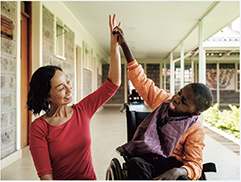
Dr. Kumon communicating with a child user of the facility (Photo: The Garden of Siloam (CHIBA Yasuyoshi))
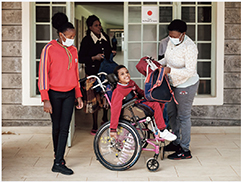
A child user and staff members at the facility that was expanded through assistance from the Government of Japan (Photo: The Garden of Siloam (CHIBA Yasuyoshi))
Note 1: See Note 87.
Glossary
- Global Survivors Fund (GSF)
- Fund launched by Dr. Denis Mukwege and Ms. Nadia Murad, Nobel Peace Prize laureates 2018. It aims to facilitate access to reparations and support for survivors of conflict-related sexual violence against the backdrop that many of them do not receive public reparations. GSF conducts awareness-raising activities regarding the development of the judicial system to support and give relief to survivors.
- Note 78: Thematic policies formulated in 2016 to promote the active participation of women in development cooperation.
- Note 79: Integrating a gender perspective into all policies, measures, and projects in order to achieve gender equality in every field. In the field of development, it refers to the process of clarifying development challenges, needs, and impacts on both men and women, at every stage of planning, implementation, monitoring, and evaluation, of all development policies, measures, and projects, based on the premise that they have different impacts on men and women.
- Note 80: The launch of We-Fi was announced at the G20 Hamburg Summit in 2017. By assisting women entrepreneurs and WSMEs in developing countries to overcome various obstacles they face such as access to finance and legal systems and regulations, this initiative aims to promote the prompt economic independence of women in developing countries and their social and economic participation, and to realize regional stability, reconstruction, and peacebuilding.
- Note 81: An international conference that Japan has held since 2014 as part of its efforts to realize gender equality and women’s empowerment, which are among the priority issues for the Government of Japan, both domestically and internationally. It is known as “WAW!” and is an abbreviation for World Assembly for Women.
- Note 82: See also MOFA’s website (https://www.mofa.go.jp/fp/hr_ha/page23e_000466.html) for Japan’s efforts regarding the prevention of sexual violence in conflict.
- Note 83: In 2000, the United Nations Security Council unanimously adopted resolution 1325 on Women, Peace and Security (WPS), the first resolution in the Council’s history to state that equal participation of women, protection from sexual violence in conflict, and gender equality are necessary for international peace, conflict prevention, and conflict resolution.
- Note 84: The largest network on WPS among UN member states to share lessons learned and good practices. In addition to governments, regional organizations such as the North Atlantic Treaty Organization (NATO), the Organization for Security and Co-operation in Europe (OSCE), the African Union (AU), and the Association of Southeast Asian Nations (ASEAN) also participate. As of September 2023, a total of 100 members from 90 countries and 10 regional organizations participate in the network.
- Note 85: G7 WPS is an abbreviation for G7 Women, Peace and Security.
- Note 86: A convention that stipulates measures to realize the rights of persons with disabilities, with the aim of ensuring that persons with disabilities can enjoy human rights and fundamental freedoms and promoting respect for the inherent dignity of persons with disabilities. Japan ratified the Convention in 2014.
- Note 87: Based on the concept of human security, this is a type of grant aid (with a maximum grant amount of 10 million yen in principle) that provides the necessary funds for relatively small-scale projects with the aim of socio-economic development in developing countries. The grant aid directly contributes to the residents of those countries. The recipients of the funds include local NGOs, local public entities, and other organizations. See MOFA’s website on the details of the program and past achievements (https://www.mofa.go.jp/mofaj/gaiko/oda/files/000071826.pdf).
